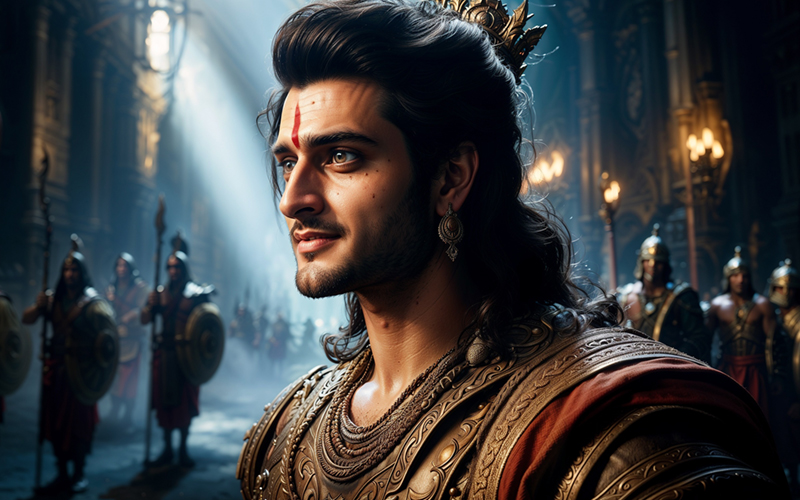Physical Address
Empirical System, 105 First Floor Pitru Krupa, Opp. R.K. Desai College, Koparli Road, Vapi (Gujarat) 396 191
Physical Address
Empirical System, 105 First Floor Pitru Krupa, Opp. R.K. Desai College, Koparli Road, Vapi (Gujarat) 396 191

In the grand epic of the Mahabharata, a tale of valor, virtue, and vice unfolds amidst the royal families of Hastinapura. Among the many stories of courage and righteousness, there is one often overshadowed by the larger-than-life heroes and villains: the story of Yuyutsu. A Kaurava by birth but a Pandava in spirit, Yuyutsu’s life is a testament to the power of righteousness and moral integrity.
Birth and Lineage: Dhritarashtra, the king of Hastinapura, was eager for an heir to the throne. His wife, Gandhari, had been pregnant for an extended period but had not yet given birth. Meanwhile, his brother Pandu’s wife, Kunti, gave birth to Yudhishthira, the eldest of the Pandavas. The birth of Yudhishthira raised concerns for Dhritarashtra about the succession and the continuity of his lineage.
To ensure the continuation of his line, Dhritarashtra fathered a son with Sukhada, a maidservant. Sukhada was from the Vaishya caste and was associated with Dhritarashtra. The practice of kings having children with women from other varnas was not uncommon in ancient times, often done to secure heirs or strengthen political alliances.
Yuyutsu, born from this union, was raised alongside the other Kaurava princes. Despite being a half-brother to the Kauravas, Yuyutsu was integrated into the royal family and received the same training and education as his brothers.
Character and Disposition: From an early age, Yuyutsu displayed a keen sense of dharma (righteousness). Unlike his brothers, who were largely influenced by Duryodhana’s ambitions and Shakuni’s manipulations, Yuyutsu developed a balanced perspective. He often questioned the moral implications of their actions. His mixed heritage and the values imbibed from his mother contributed to his strong ethical stance.
The Kurukshetra War: A Critical Choice
As the Kurukshetra war loomed large, the warriors of Hastinapura had to choose sides. The conflict was not merely a war over a kingdom but a battle between dharma and adharma (unrighteousness). Yuyutsu faced a profound moral dilemma. Despite being a Kaurava, he could not ignore the injustices perpetrated by his brothers, especially Duryodhana’s treacherous acts and the humiliation of Draupadi.
According to the Bhagavata Purana and other texts, Yuyutsu, despite being a Kaurava by birth, decided to join the Pandavas. This decision was made during the assembly before the war began, where he declared his allegiance to the side of dharma, aligning with the Pandavas. Yuyutsu’s defection was an act of great courage, signifying his commitment to righteousness over familial loyalty.
His decision was not easy; it meant turning his back on his brothers and risking his life. However, Yuyutsu believed that the Pandavas were on the side of dharma, and supporting them was the righteous path.
Role in the War: During the Kurukshetra war, Yuyutsu fought valiantly for the Pandavas. Although not a central figure in the battles, his defection symbolized a critical moral victory. He provided the Pandavas with insights into the Kauravas’ strategies and contributed to their war effort. His actions were guided not by personal gain but by a genuine belief in upholding dharma.
Post-War and Legacy: Yuyutsu was among the few survivors of the devastating Kurukshetra war. After the Pandavas emerged victorious, Yudhishthira ascended the throne of Hastinapura. Yuyutsu continued to serve the new kingdom with loyalty and integrity. He was respected for his moral courage and his willingness to stand up for what was right, even at great personal cost.
His legacy, though not as celebrated as the major heroes of the Mahabharata, remains a powerful reminder of the importance of righteousness. Yuyutsu’s life exemplifies the scriptures’ teachings that true dharma often requires difficult choices and that standing up for what is right is the highest duty, irrespective of familial or societal pressures.
Yuyutsu’s story is a beacon of moral clarity in the complex narrative of the Mahabharata. He represents the voice of conscience and the power of individual choice. His decision to support the Pandavas, despite being born among the Kauravas, underscores the timeless message of the scriptures: dharma is supreme, and adhering to it is the path to true honor and righteousness.